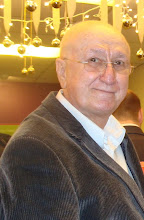
For the first time in months I'm joining the crowds of suburban commuters on their way to the downtown core of the city. They are heading for another day of work, I'm on my way for a CT Scan to see if the back pains I've been experiencing are a re-metastasizing of the cancer in my bones.
As the GO train pulls out of Guildwood Station, the commuters sleep, or read papers, type furiously on their laptops or talk quietly in small groups. I am reading a pre-publication copy of Spiritual Partnership by Gary Zukav that was sent to me by Trish Collins at TLC Book Tours.
I last read Zukav back in the 70's when he wrote The Dancing Wu Li Masters, a brilliant and riveting introduction to Quantum Physics and the way it is changing, or confirming, our view of the world.
While I'm deeply involved with his new book by now and finding Zukav as engaging a writer as always, I originally had trouble getting into it, trouble getting past the first paragraph of the preface, in fact, where he claims he is about to reveal a change he has discovered that will have a greater impact on the human race than the discovery of fire, or the wheel or religion or science.
And I'm thinking, oh come on! Get for real.
The train trudges on into the city, all of the seats beginning to fill as we stop at the Eglinton, Scarborough and Danforth Stations. The woman across from me is knitting and I realize it has been a long time since I saw anyone doing that. Behind me a man is talking loudly into his cell phone, his voice filling the carriage as he relays instructions for people at his work to follow before his arrival this morning.
Zukav's discovery is that millions of people around the world are evolving an additional sense, that allows them to know more about people than is offered by the traditional five senses, a form of multisensory perception. I'm reminded of Jeremy Rifkin's work on the way civilization is evolving into a more empathic place, our ability to empathize extending beyond our family and friends, beyond our country, indeed beyond humanity to embrace the biosphere itself, just as climate change begins to demand we be able to see ourselves from a wider perspective if we have any hope of surviving as a specie.
The train pulls into Union Station and begins to unload its vast hoard of workers into the huge office towers of the city. I join those heading down into the subway, the long platforms filled with impatient humanity, the increasing rumble of distant trains whispering to us from darkened tunnels.
Unlike Rifkin, Zukav is more interested in how our expanding multisensory perception will allow us to evolve spiritually, to grow into more authentic human beings. To a large extent we do it through our newly expanded ability to relate to others. Zukav defines a spiritual partnership as a partnership between equals for the purpose of spiritual growth. Those limited to the five senses work to change the external world in order to quell fears like hunger, pain, or loneliness, while those with a multisensory perspective are motivated by love instead of fear and work to bring their potential into line with their soul, not by seeking to control others or the world outside themselves.
At Dundas I transfer to the streetcar for the additional trip to Bathurst and the Toronto Western Hospital on the outer edge of Toronto's China Town. At the hospital I'm taken to a waiting room and given a barium drink and an hour alone to consume it.
The bulk of Zukav's work is filled with personal examples of spiritual growth from his own life and from his relationship with his spiritual partner Linda Francis. The second half of the book focuses on how exploring commitment, courage, compassion, communication and action can be combined to create spiritual growth in our self, in our relationships and in our world. He is a poignant and engaging writer and my time passes quickly.
But finally the technician arrives and I am escorted, in my hospital gown, down the lengthy corridor to the waiting CT Scanner. I am injected with a substance to heighten the contrast for the imaging and am also given a paste to swallow to highlight the image of my throat. Then I lay with my sore back on the hard surface of the table, stretch my arms behind my head and am inserted into the machine.
After the scanning the technician lowers the table back to normal, removes the needle from my arm and tells me I am free to go.
But I discover I am unable to move. No longer have the strength in my back to lift myself from the table. And despite the Tylenol with codeine I took this morning, my lower back is in severe pain.
"Are you alright," the technician asks.
"I can't move," I tell him. "My back really hurts."
He goes to the next room to get help and together with the assistance of the second technician we push me through the pain into a seating position. The waves of pain in my back begin to lessen and after a while I am able to stand, retrieve my clothes and carefully walk the corridor back to the change room.
I've brought some additional medication with me, and take it with water from the fountain. I'm shaken by discovering my inability to rise from the table. I can face pain, but the thought of immobilization is frightening. I have a long way to go before I get home.
And the chance to talk this through with my own Linda, my own spiritual partner, who has put aside so much of her own life to care for me through the past year. She deserves roses, not an escalations of my own troubles.
I put Zukav aside for now and hobble back out into the rush of the city and my journey home.
Valentine's Day Breakfast
19 hours ago






